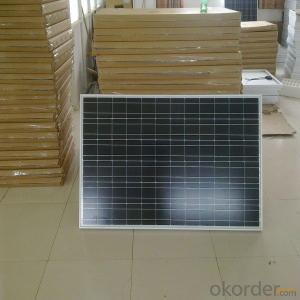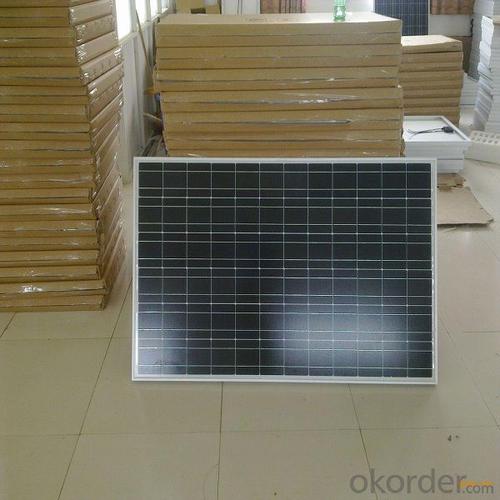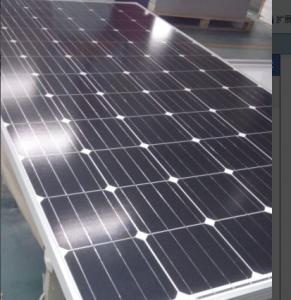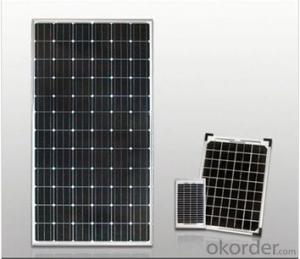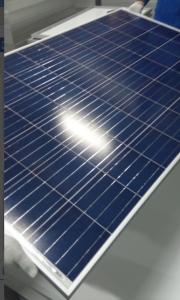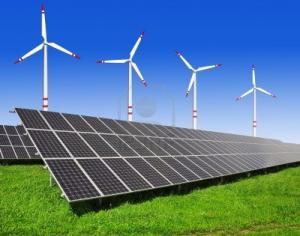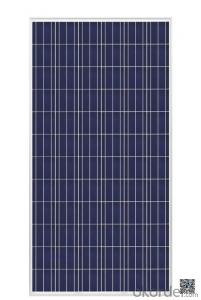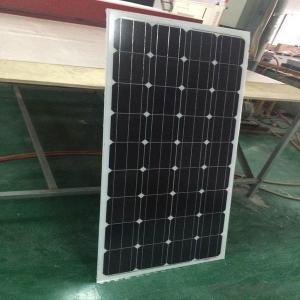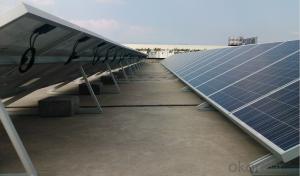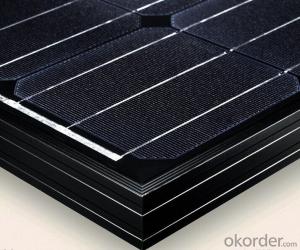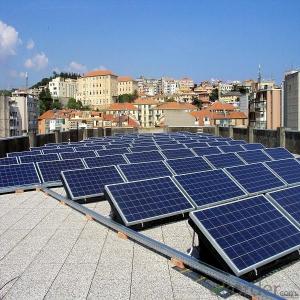60W Full Spectrum High Efficiency Poly Solar Panel Made in China
- Loading Port:
- Shanghai
- Payment Terms:
- TT OR LC
- Min Order Qty:
- 1000 watt
- Supply Capability:
- 1000000 watt/month
OKorder Service Pledge
OKorder Financial Service
You Might Also Like
Specification
Product Description
Product Description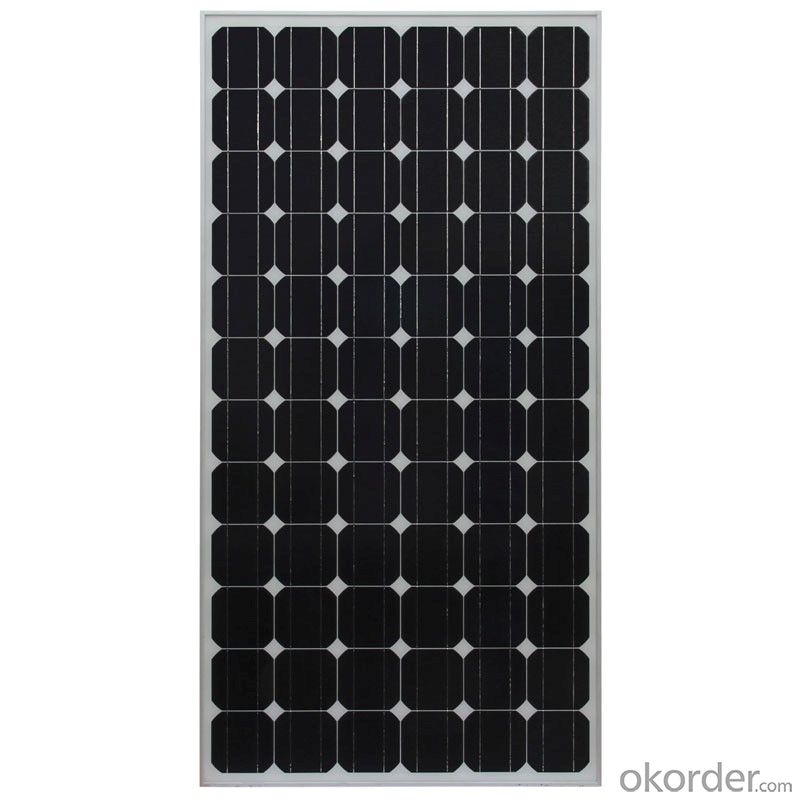 Solar module/panel with high efficiency solar cells
Solar module/panel with high efficiency solar cells
Strong, lightweight aluminum frame design with reinforced sealing and load hold to prevent freezing and warping, and stand against high wind.
Under Standard Test Conditions(STC): Irradiance of 1000W/m2, Am1.5 and 25º C cell temperature.
Mechanical Characteristics
Dimensions: 670mm(L) x 620mm(W) x 30mm(H)
Weight: 6.1kg
Solar Cells: Polycrystalline solar cells, 36 cells
Construction: Front: High-transmission 3.2mm tempered glass; Encapsulate: EVA; Back: TPT
Frame: Clear anodized aluminum alloy Color: Silver
Product features:
1. The modules use high-quality imported polycrystalline or monocrystalline solar cells;
Enclosed by high-rigidity tempered glass, with excellent light transmittance and output performance;
2. Surface treated with reflection-reducing process, increasing the light absorption.
Back sealed with anti-aging EVA, resistant from moisture and corrosion.
3. The efficiency of our monocrystalline solar cell is over 17%, and polycrystalline panel is over 16%. We stipulate, the allowance of each panel's rated power has to be positive. Each panel is strictly tested before leaving the factory.
4. Our solar panel is designed with a lifetime of 25 years, and guaranteed that the power decline less than 10% within 10 years, and 20% within 20 years.
| Performance | |
| Rated Power[Pmax] | 60W |
| Power Tolerance | ± 5% |
| Nominal Voltage | 17.2V |
| Design Life | 25 years |
| Electrical Characteristics | |
| Maximum Power [Pmax] | 60W± 5% |
| Maximum Power Voltage [Vmp] | 17.2V± 3% |
| Maximum Power Current [Imp] | 3.49A± 3% |
| Short-Circuit Current [Isc] | 3.85A± 3% |
| Open-Circuit Voltage [Voc] | 21.04V± 3% |
| Current Temperature Coefficient | 0.08%/º C |
| Voltage Temperature Coefficient | - 0.32%/º C |
| Power Temperature Coefficient | -0.38%/º C |
- Q: I want to know how you can store energy using a solar panel. The energy stored needs to be stored so that a light or laptop charger can plug in to it.
- Batteries my man... but you will need a charge controller the silicon panel will produce dc and you will need an inverter for an ac light
- Q: How do solar panels impact air pollution?
- Solar panels have a positive impact on air pollution as they produce clean energy without emitting harmful pollutants or greenhouse gases into the atmosphere. By replacing fossil fuel-based energy sources, solar panels help reduce air pollution and improve air quality, resulting in a healthier and more sustainable environment.
- Q: Online stores selling solar photo-voltaic generation kits gives specs indicating the power generation capability of the system. For example, Solar World Grid-Tie Solar Electric System with 245W Panels PV Powered PVP2000 Inverter, .2 to 2.4 kW. This seems to indicate that the system can generate .2 to 2.4 kW. Is that per day? Per month? I'm trying to calculate the return on investment, but can't because I don't know how much power a system such as this will generate in a month.
- That would have to be in that instant of time or they would say kilo watt hours or KWH for short. But being the sun doesn't shine at the same intensity over any given hour you couldn't say a solar panel rated at 2.4KW would produce 2.4KWH of electric in a given hour. The power produced would have to vary as clouds passed over head. The power would also be reduced on days of heavy overcast or rain/ snow.
- Q: Can solar panels be installed on art installations or sculptures?
- Yes, solar panels can be installed on art installations or sculptures. In fact, integrating solar panels into art installations and sculptures has become a popular trend in recent years. This allows for the creation of sustainable and eco-friendly artworks that can generate renewable energy. Additionally, the combination of solar panels and art offers an innovative way to raise awareness about renewable energy and environmental issues.
- Q: Can solar panels be used to power a greenhouse?
- Yes, solar panels can be used to power a greenhouse. Solar panels are a sustainable and efficient energy source that can generate electricity to operate various greenhouse systems, such as lighting, heating, ventilation, and irrigation. By harnessing the sun's energy, solar panels provide a clean and renewable power supply, reducing greenhouse gas emissions and minimizing reliance on conventional energy sources.
- Q: Can solar panels be installed on a winery or vineyard?
- Yes, solar panels can be installed on a winery or vineyard. In fact, many wineries and vineyards around the world have embraced solar energy as a sustainable and cost-effective solution to power their operations. The vast open spaces available on these properties make them ideal for solar panel installations, which can generate clean and renewable electricity to meet the energy demands of the winery or vineyard. Additionally, solar panels can help wineries and vineyards reduce their carbon footprint and lower their energy costs in the long run.
- Q: Can solar panels be used to power a school?
- Yes, solar panels can definitely be used to power a school. Solar panels are a sustainable and renewable source of energy that can generate electricity by harnessing the sun's energy. By installing solar panels on the roofs or grounds of a school, it is possible to generate enough electricity to power various electrical systems within the school, including lighting, heating, cooling, and other appliances. This can not only help reduce the school's reliance on non-renewable energy sources but also lead to significant cost savings in the long run.
- Q: how does solar panels work?
- Solar panels collect solar radiation from the sun and actively convert that energy to electricity. Solar panels are comprised of several individual solar cells. These solar cells function similarly to large semiconductors and utilize a large-area p-n junction diode. When the solar cells are exposed to sunlight, the p-n junction diodes convert the energy from sunlight into usable electrical energy. The energy generated from photons striking the surface of the solar panel allows electrons to be knocked out of their orbits and released, and electric fields in the solar cells pull these free electrons in a directional current, from which metal contacts in the solar cell can generate electricity. The more solar cells in a solar panel and the higher the quality of the solar cells, the more total electrical output the solar panel can produce. The conversion of sunlight to usable electrical energy has been dubbed the Photovoltaic Effect. The photovoltaic effect arises from the properties of the p-n junction diode, as such there are no moving parts in a solar panel.
- Q: I want to install solar panels in my roof and most installers don't recommend any particular brand. Do you have experience with any particular brand that has worked for you or anybody you know? Does the brand of the panel make a difference?
- I didn't research this. I do know that you must install them on the side or area of the roof that receives the most Sun all day. You can get information at stores like Lowes or HomeDepot.
- Q: Can solar panels be installed on golf courses or recreational facilities?
- Yes, solar panels can be installed on golf courses or recreational facilities. These locations often have vast open spaces with ample sunlight, making them ideal for harnessing solar energy. Additionally, installing solar panels in these areas can help offset the energy demands of the facilities, reduce carbon emissions, and promote sustainability.
Send your message to us
60W Full Spectrum High Efficiency Poly Solar Panel Made in China
- Loading Port:
- Shanghai
- Payment Terms:
- TT OR LC
- Min Order Qty:
- 1000 watt
- Supply Capability:
- 1000000 watt/month
OKorder Service Pledge
OKorder Financial Service
Similar products
Hot products
Hot Searches
Related keywords
